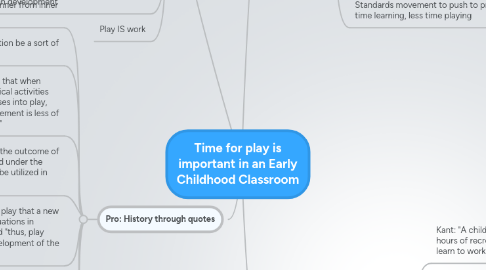Time for play is important in an Early Childhood Classroom
by T Flint


1. Pros
1.1. Children need play
1.2. Play aids in development
1.2.1. Cognitive skills
1.2.2. Social/Emotional Skills
1.2.3. Literacy Skills
1.2.4. Academic skills
1.2.5. Language Skills
1.2.6. Creativity
1.3. Play enhances memory
1.4. Play enhances language/vocabulary
1.5. Play increases self-regualtory behaviors
1.6. Play makes learning fun/engaging
1.7. Children learn through play naturally/authentically
1.8. Play is important to education, learning, and human development
1.9. Play IS work
2. Pro: History through quotes
2.1. Froebel: "Play is the highest phase of child-development-of human development at this period: for it is self-active representation of the inner-representation of the inner from inner necessity and impulse."
2.2. Plato:"...but let early education be a sort of amusement;"
2.3. Dewey: "Experience has shown that when children have a chance at physical activities which bring their natural impulses into play, going to school is a joy, management is less of a burden, and learning is easier"
2.4. Froebel: "Spontaneous play is the outcome of vital energy and buoyancy, and under the guidance of the teacher, may be utilized in social development."
2.5. Vygotsky: "I ti s the essence of play that a new relation is created between situations in thought and real situations" and "thus, play creates a zone of proximal development of the child."
2.6. Bruner: "Plainly, play with other children does have a theraputic role or, in any case, an important role in helping children to take their place more easily in the stressful social activities of later life"
2.7. Vygotsky: "From the point of view of development, creating an imaginary situation can be regarded as a means of developing abstract thought"
2.8. Hymes: "play is a solid means of helping children learn. It is a way for teachers to assess what a child understands and what interests the child. For a world of play and pretend can always allow the child to be powerful, able, and successful"
3. Cons
3.1. Time needs to be alotted for more academic instruction
3.2. It is essential that children learn "school" skills
3.2.1. focus
3.2.2. alphabet
3.2.3. counting
